#Philip of Macedon
Text
Cambridge Companion to Alexander the Great
I know that academic books are often just too expensive for the casual fan, but this new Companion from Cambridge, in its paperback format, is surprisingly cheap ($44.99 pback, and $42.74 Kindle).
I HIGHLY recommend it, as it's an update to the older Brill's Companion to Alexander the Great (2003). If you have a serious interest in Alexander, you should snag it. Yes, I have two chapters in it, but that's not why I'm recommending it. I get no royalties. I'm recommending it because Daniel Ogden corralled the best scholars currently writing in the field.
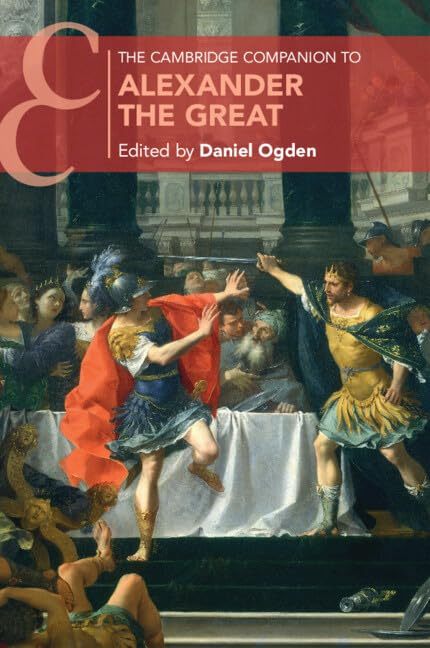
If you're not familiar already with these "Companion" books from a variety of academic publishers (Wiley-Blackwell, Brill, Cambridge, etc.), they're designed to be summaries of the current state of research on various topics in the ancient world. Yes, they have footnotes, but you won't be wading through a lot of Greek and Latin, or complicated arguments. They're meant to be introductions for serious non-specialists and grad students who want to know what the current research says, but don't have time to read thirty-nine academic articles on, say, Who Killed Philip? Each chapter has "further reading" suggestions if you'd like to go deeper. And the bibliography is comprehensive. These Companions are what I go to when I'm working on, say, a class about a topic that I'm not a specialist in (like the Aegean Bronze Age).
So YES, if you're an Alexander fan, you want to purchase this book, especially at this price. Many Companion books run over $100. That this one is under $50, at least in paperback form, is a DEAL.
#alexander the great#Classics#Cambridge Companion to Alexander the Great#Philip of Macedon#ancient Macedonia#Daniel Ogden#ancient Greece#tagamemnon
44 notes
·
View notes
Text

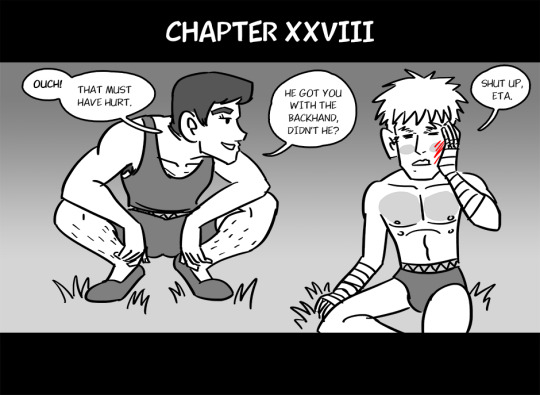









Leon x Lykos
Chapter XXVIII
back - start - next
about - chapters - instagram - tapas
10 notes
·
View notes
Text


Philippos appears in Chapter 1 of the comic, then again in Chapter 25 which takes place 10 years later. The historical King Philip of Macedon is known to have lost his right eye during a siege. I knew early on I wanted to incorporate his missing eye into his design when he eventually returned in the comic.
0 notes
Text
Some Guy: I wouldn't touch that with a 20 foot pole!
Philip II of Macedon: ...what did you just say?
#Philip of Macedon#philip ii#philip ii of Macedon#alexander the great#Macedonian Empire#Macedonian sarrisa
0 notes
Text






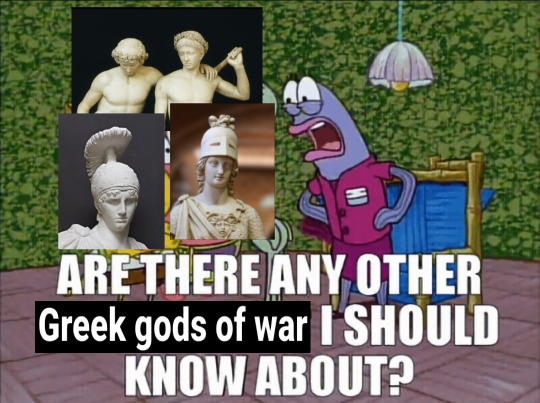
#greek mythology#those greeks sure do love warring#mostly with other greeks#it took philip of macedon to conquer them for the greeks to unify
2K notes
·
View notes
Photo
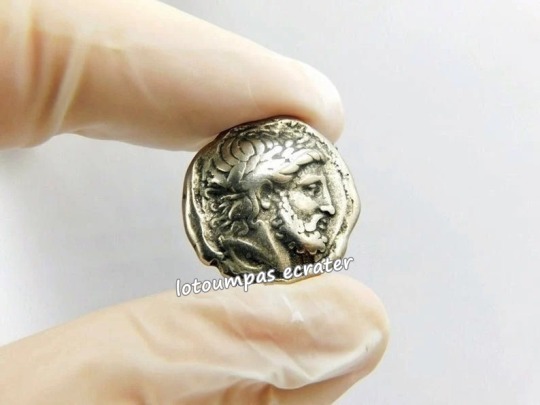
King Philip Ancient Greek Coin Tetradrachm Macedonian Kingdom Reproduction Replica Coin - Lotoumpas.
https://lotoumpas.ecrater.com/
#king philip#macedon#philip of macedon#macedonian#kingdom#alexander#great#father#alexander the great#greek#greece#ancient greece#tetradrachm#horse#jockey#horse races#king#philip#god#zeus#god zeus#coin#coins#ancient coins#collectible#collector#collectibles
0 notes
Text
the assassination of Philip of Macedon (336 BC)
Philip II of Macedon ruled over Macedonia from 359BC until his assassination in 336BC. He was killed by his bodyguard, Pausanias of Orestis, during the festivities for the marriage of Alexander I of Epirus and Cleopatra of Macedon (Philip's daughter).

Philip was entering the theatre of Aegae (capital of the Macedonians) unprotected, in order to seem more approachable and conspicuous. He was then approached by Pausanias and stabbed in the ribs with a dagger. The assassin immediately fled and ran towards the city gates, where his associates were waiting with horses for his getaway. However, Pausanias tripped on a vine root and was quickly overpowered by his fellow bodyguards, who stabbed him to death.
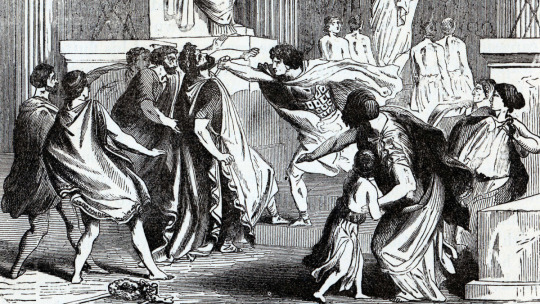
(1880 illustration depicting the assassination)
the motive
According to Greek historian Diodorus of Sicily in his World History, Pausanias of Orestis verbally abused his rival for the king's affections, a man also named Pausanias. The second Pausanias was unable to tolerate the insult and decided to prove himself by positioning himself in front of the king during battle, subsequently dying from the blows he protected Philip from.
Philip's uncle, Attalus, wanted to punish Pausanias for causing the death of his friend (the other Pausanias). He invited him to dinner, got him drunk, and allowed his stablemen to rape Pausanias. Philip, however, did not punish Attalus, possibly due to their kinship and the fact that Philip needed Attalus (he commanded Philip's forces). While Philip attempted to compensate by promoting Pausanias, he remained resentful and wanted to exact revenge on the king, who had denied him justice.
Despite this explanation, suspicions still fell on Philip's wife Olympias and his son Alexander the Great, as they had a lot to gain from Philip's death. In the epitome of Pompeius Trogus' Philippic Histories, Latin writer Justin suggests that Pausanias was instigated to commit the act by Olympias, and that Alexander was not unaware of his father's impending death.


(18th century piece depicting Olympias and bust of Alexander the Great, circa 330BC)
part 1/25 of a series introducing the assassinations outlined in Francis John's 1903 book, Famous Assassinations of History from Philip of Macedon, 336 B.C., to Alexander of Servia, A.D. 1903
#history#philip of macedon#alexander the great#macedonian history#ancient history#macedonia#q#historical assassinations series#ancient macedon#classics#long post#.
1 note
·
View note
Photo
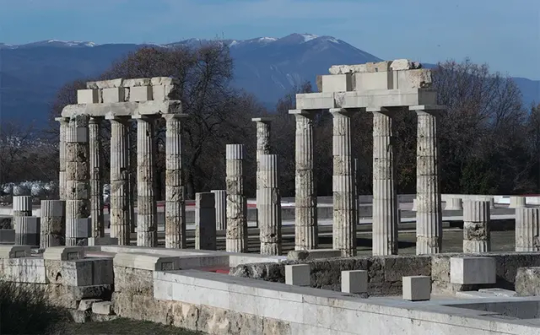
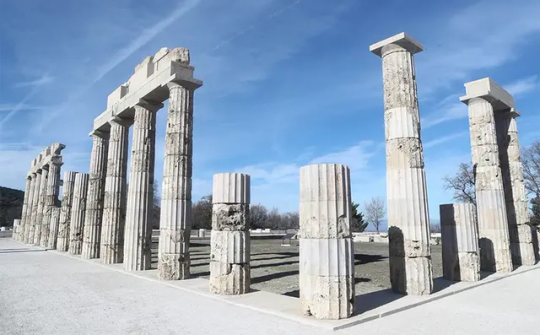
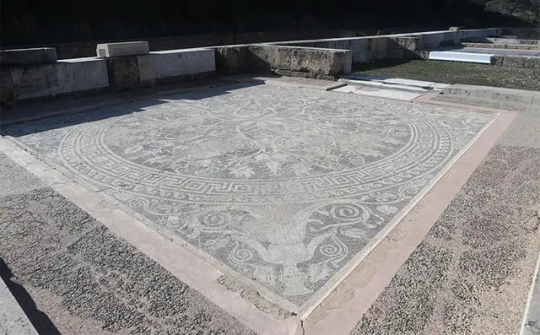

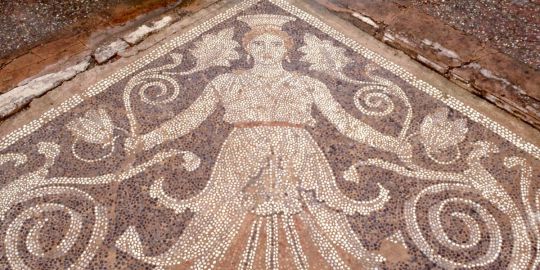
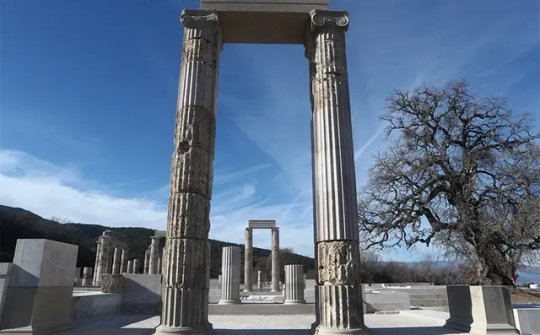
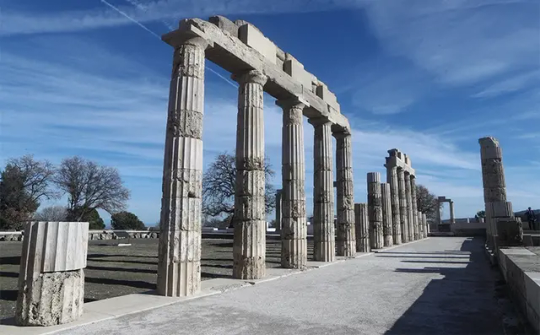
Photos from the Palace of Aegae (~ 350 BC), the royal residence of Philip II of Macedon and his son Alexander the Great, in Aegae, Imathia, Greece. The site can be visited after being closed for many years but it is still under reconstruction works.
Source of the mosaic close-up
Source of the rest of the photos
#greece#europe#alexander the great#philip ii of macedon#ancient greece#macedonia#imathia#aegae#palace of aegae#mainland#greek culture#greek facts#greek history
182 notes
·
View notes
Text
I think every world-historical conqueror should break a few bones, the better to identify their skeletons afterward
30 notes
·
View notes
Note
What was Alexander’s relationship with his sisters like?
Short answer: We mostly don’t know.
Longer answer: We have some clues that he may have got on well at least with Kleopatra and Thessalonike. Kynanne is more of a crap-shoot, as she was married to his cousin and rival, Amyntas. But as Philip arranged that marriage, she had little/no say in the matter, so we just don’t know what she thought of her husband-cousin versus her brother. (Not addressing the infant Europe, as she died at just a few weeks.)
First, let me link to an article by Beth Carney, and at the end, I’ll add some links to my own prior entries that address the question too.
Elizabeth Carney, “The Sisters of Alexander the Great: Royal Relics” Historia 37.4 (1988), 385-404.*
Beth’s article discusses Argead marriage policies, and the fate of the women after ATG’s death. I know she’s changed her mind about a few things, but it’s still well worth reading.
Also, a general reminder to folks who may be new to Alexander/Macedonia … Macedonian kings practiced royal polygamy: e.g., they married for politics, not love, and had more than one wife at the same time. Philip married 7 women (the most of any Macedonian king), although there weren’t 7 wives living in the palace at once. There may have been as many as 5 at times, however.
Because of royal polygamy, they did not use the term basilissa (queen) until after Alexander’s death. The chief wife was the mother of the heir; she had the most power. Because of the rivalry inherent in such courts, a woman’s primary allegiance was to her son, not her husband. Her secondary allegiance would be to her father (if living) and/or brothers. This was not unique to Macedonia, but a feature of most courts with polygamous structures.
These are not love matches, although our later sources may present them as love matches. (These authors had their own ideological reasons for such characterizations.) Did love never come after marriage? Perhaps. It would have depended. Also, within the women’s rooms, wives may have allied with each other at points, particularly if several of them. If only two (as seems more characteristic in Macedonia, aside from Philip), they’d have been rivals seeking to produce the heir.
I state all that to explain why Alexander’s sisters may have courted their brother’s affection (and protection), after Philip’s death. Only Kleopatra had a son, and he was 12 at most at Alexander’s death.

In his final year, Philip married off Alexander’s older sister, Kynanne (d. of Audata, ergo half- Illyrian), and Alexander’s younger and only full sister, Kleopatra (d. of Olympias). Kleopatra’s wedding was literally the day before Philip’s assassination. The timing of Kynnane’s marriage is less clear, but Philip married her to Amyntas, his nephew (her cousin), some time after his own marriage to his last wife, Kleopatra Eurydike. Kynnane had a daughter by Amyntas, Hadea (later Hadea Eurydike). We’re not sure if she was born before or after her father’s execution by Alexander, but it does let us nail down her age to c. 12/13 at Alexander’s death.
After he had Amyntas executed, Alexander planned to marry Kynnane to one of his trusted allies, Langaros, king of Agriana, which lay north of Macedonia, between Paionia and Illyria. Agriana was arguably Paionian, but similar to Illyria. Ergo, this may show a bit of thoughtfulness on Alexander’s part, to match his sister to a man who wouldn’t attempt to trammel her. Recall that Illyrian women wielded more power and even fought in battle. Yet Langaros died (perhaps of injury) before Alexander could make good on that.
It would be the last time Alexander planned any nuptials for his sisters. In part because he invaded Persia not long after, but it wouldn’t have stopped him from summoning one of them if he’d really wanted to marry her off.
Kynanne raised her daughter Hadea in traditional Illyrian ways, which Alexander allowed (although he probably couldn’t have stopped her). After his death, she took off to Asia to see Hadea married to her uncle, (Philip III) Arrhidaios. Kynanne was murdered by Perdikkas’s brother Alkestas, because Perdikkas (then regent) didn’t want the marriage. BUT the army (who liked and respected Kynanne) forced Alkestas to allow it anyway. Hadea (now) Eurydike and Philip III Arrhidaios eventually fell under Kassandros’s authority/possession, where she/they opposed Olympias and baby Alexander IV (and Roxane).
It was inevitable that the co-kingship that followed ATG’s death wouldn’t hold, and Hadea, who clearly wore the pants, wasn’t about to step aside for her cousin Alexander IV. Nor did Kassandros want them to, as he could control them. He couldn’t control Olympias. Yet none of that would necessarily reflect how Kynanne and Hadea had felt about their brother/uncle during his lifetime.
So, we must say the jury is out on Kynanne’s relationship with Alexander.
But for Kleopatra and Thessalonike, I do believe we have enough hints that they cared for him and he for them.
Kleopatra’s husband (another Alexander, of Epiros) died in combat in Italy in 332—around the time Alexander was besieging Tyre and Gaza, or four years after their marriage. In that time, Kleopatra produced two children, a girl (Kadmea) and a boy (Neoptolemos). The girl was named to honor her uncle’s victory over Thebes,** which happened at the tail-end of 335. As Alexander of Macedon and Alexander of Epiros both left on separate campaigns in 334, the boy would have to have been fathered not long after Kadmea was born. (It’s possible that Alexander of Epiros didn’t get to Italy until 333.)
After Alexander of Epiros’s death, Kleopatra did not marry again, although after her brother died, she had a couple marriage offers/offered marriage herself. She was THE prize during the early Successor wars…the full sister of Alexander.
Two titbits might suggest she was close to him (even if he didn’t marry her off again). First, the name of her first child is for his victory, not one by her husband. Sure, Alexander of Epiros didn’t have a battle victory at that point to name her for…but he could have insisted on a family name. Instead, he let Kleopatra give the child a name celebrating Alexander of Macedon’s victory. I suspect she fought for that.
Second, an anecdote reports that when Alexander was told his sister was having an affair some years after she’d become a widow, he reportedly replied, “Well, she ought to have a little fun.” This, btw, was viewed as a bad answer…e.g., he didn’t properly discipline her. As Alexander was constantly used for moral lessons (good or bad), we should take it with a grain of salt. But it’s possible his approximate reaction was preserved and became fodder for moralizing about those wild, half-barbarian Macedonians from the north…couldn’t keep their women in check!
As for Thessalonike, data here is also circumstantial. She stayed with Olympias after Alexander’s death and was never married until after Olympias herself was killed by Kassandros—who then forced her to marry him to cement his claim to the Macedonian throne. She had a sad life, at least in her latter years. Her eldest son (Philip) wasn’t healthy and died not long after he became king. Her second son (Antipatros) and her last son (Alexandros) apparently hated each other. After Philip’s death, Thessalonike argued that Antipatros should co-rule with the younger Alexandros. So Antipatros killed his mother! (Matricide, folks, is SUPER-bad.) Then Alexandros killed Antipatros, and was eventually killed in turn by Demetrios Poliorketes.
Well, if Justin can be trusted, and there are problems with Justin. Ergo, it’s possible that internecine spate of murders didn’t go the way Justin reports.
Yet the naming of her youngest boy may tell a story, along with her insistence that he co-rule with his brother.
There’s also the legend of Mermaid Thessalonike, but we can’t take that as any sort of evidence.
Here are some additional posts that also talk about the sisters:
“Writing Kleopatra and Alexander’s Other Sisters” — Although aimed primarily at the novels, it obviously must deal with the girls as historical persons. Pretty short for me.
“What Philip Thought about His Other Children” — A sideways take on this same question. Not long.
“On Amyntas” — About Alexander’s older cousin, his real rival for the throne when Philp was assassinated. Also discusses Kynanne as a matter-of-course. Not long.
“On Kassandros” — Mostly about Antipatros’s son Kassandros, who had Alexander IV murdered, but also discusses Thessalonike, who he forced to marry him. Relatively long.
--------------------------------------------
* The link takes you to academia.edu, where, by clicking on Beth’s name, you can find more of her articles. Keep in mind the woman has something north of 150, many on women, PLUS a bunch of books. Not everything is uploaded due to copyright, but several of her older articles are, such as this one.
** It was something of a “thing,” at least in Macedon, for daughters to be named in honor of their father’s victories. Kynanne not so much, but Kleopatra means “Glory of Her Father,” and both Thessalonike (Victory in Thessaly) and Europe (Victory in Europe) reflected their father’s triumphs.
#asks#alexander the great#alexander the great's sisters#kleopatra of macedon#thessalonike of macedon#kynnane of macedon#hadea eurydike#philip II of macedon#philip of macedon#alexander of epirus#classics#ancient macedonia#ancient greece#alexander's sisters#ancient greek family relations
18 notes
·
View notes
Text
Philip II : For the last time, Alexander, you cannot be a part of this family if you are a satanist!
Alexander : ...
Alexander : I was literally just eating a salad.
#alexander the great#alexander the making of a god#philip ii of macedon#I have a hyper fixation on Alexander the Great#and the docu-series is very good#I'm gay and autistic#what more do you need to love Alexander#incorrect quotes
15 notes
·
View notes
Text
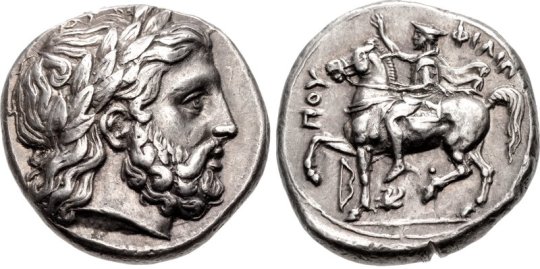
Tetradrachm of Philip II of Macedon. On the obverse, the laureate head of Zeus (from whom the Argead dynasty of Macedon claimed descent via Heracles); on the reverse, Philip, on horseback and wearing the characteristic Macedonian flat hat known as the kausia. Artist unknown; minted at Amphipolis between 355 and 348 BCE. Photo credit: Classical Numismatic Group, Inc. http://www.cngcoins.com
#classics#tagamemnon#Ancient Greece#Macedon#Philip II of Macedon#Classical Greece#ancient history#Greek history#Ancient Greek history#art#art history#ancient art#Greek art#Ancient Greek art#Classical Greek art#Macedonian art#coins#ancient coins#Greek coins#Ancient Greek coins#Macedonian coins#numismatics#ancient numismatics#tetradrachm
69 notes
·
View notes
Text

Lion of Chaeronea (Χαιρώνεια; Boeotia, Greece)
This lion commemorates the defeat of Thebes by Philip II of Macedon in 338 BCE at the Battle of Chaeronea. This monument (a modern reconstruction; parts of the original reside in the British Museum and the Louvre) sits atop the site of a fourth-century mass grave, believed to be the fallen of the Sacred Band of Thebes.
#isaac.jpg#art#archaeology#classical archaeology#greek#macedonia#philip ii of macedon#thebes#sacred band of thebes#chaeronea#lion of chaeronea#χαιρώνεια#hellenistic
37 notes
·
View notes
Text
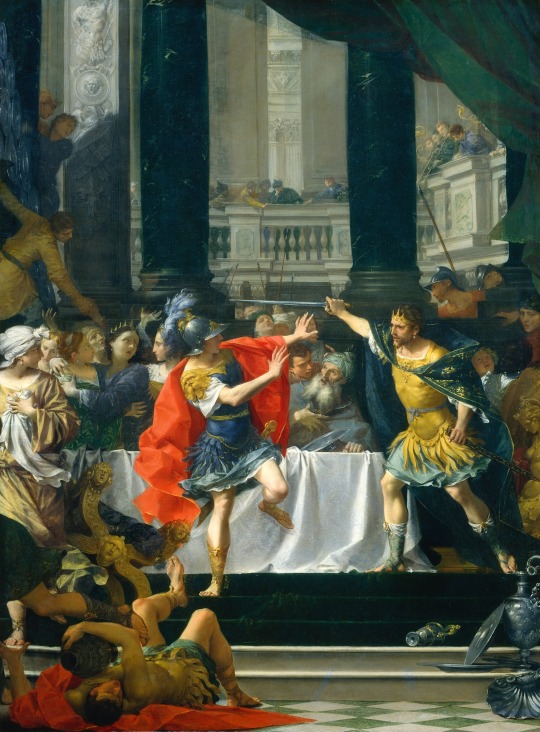
Alexander the Great Threatened by His Father
by Donato Creti
#alexander the great#alexander#father#philip ii of macedon#art#painting#history#europe#european#macedon#macedonia#ancient#greek#greece#architecture#classical#donato creti
28 notes
·
View notes
Text
"Such was the end of Philip, who had made himself the greatest of the kings of Europe in his time, and because of the extent of his kingdom had made himself a throned companion of the twelve gods"
Diodorus Siculus book 16.
7 notes
·
View notes

